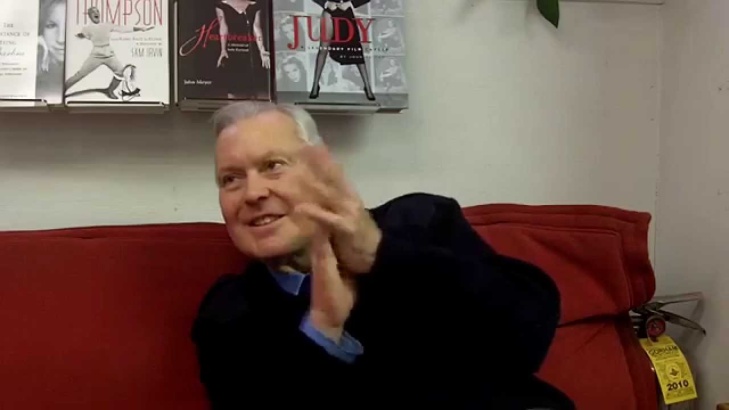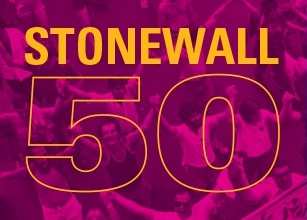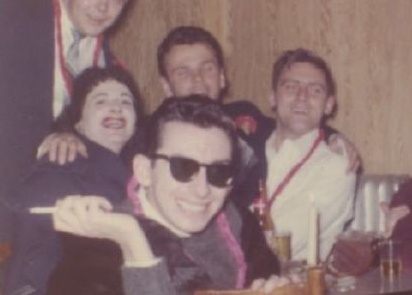Sort by:
John Mitzel Isn’t Going Anywhere

Originally published in Boston Spirit Magazine, September/October 2012, and on Mark Krone's blog Boston Queer History. John Mitzel passed away in 2013, about a year after this article was first published.
Owner of One of the Last Gay Book Stores in America Presides Over Small Intellectual Kingdom on South Street
For gay bookstores, these are the last days of disco. Legendary outlets such as Lambda Rising in Washington DC, A Different Light in San Francisco, and the Oscar Wilde Bookshop in New York have all closed. But in downtown Boston, on South Street, Calamus Book Store stubbornly remains open. “As long as I am here, this will be here,” says owner John Mitzel.
When it comes to post-Stonewall gay activism in Boston, John Mitzel was there. He was there at the first organizing meeting of Gay Pride in 1971. He was there at the beginning of gay publications such as Fag Rag and Gay Community News. And there, too, when gay people turned to the courts in 1978, establishing the Gay and Lesbian Advocates and Defenders (GLAD). He was also an early author of books primarily for the gay market. His new collection of short stories, Last Gleamings, on friends he lost to AIDS, will come out this fall. Considering his impact on gay Boston, Mitzel should be better known.
On a recent afternoon, Mitzel, 64 is sprawled on a burgundy futon sofa just below the store’s window. He is wearing his signature police officer’s uniform, shirt with shoulder epaulets, black tie with tie clasp, dark blue pants, and black oxford shoes. His white hair is combed back, parted on the left side. As customers descend the few steps into the store, the first thing they hear is Mitzel’s voice, deep and precise. He sits facing the main book display that features selections for the serious reader, an Edmund White novel, Jack Holmes and His Friend stands next to Christopher Bram’s Eminent Outlaws, a look at post World War II gay writers.Scattered throughout the store are large photography books with iconic male beauties looking at distant horizons or longingly at each other. In a small corner at the back of the store, where coal was once stored, the porn section is shelved. Mitzel is holding forth on subjects from the recent legal fight over the late philanthropist Brooke Astor’s estate to Boston’s wrenching busing wars of the 1970s. One of the few rules at the store is, don’t interrupt Mitzel.
Raised outside Cincinnati, “a beautiful city but very right-wing”, Mitzel’s parents divorced before he reached his teens. Both parents went on to marry two more times. In high school, Mitzel was popular and his grades were good. He had every reason to expect a bright future. There was however, just one problem. He began disappearing on nights and weekends, often returning in the early morning hours. At first, his mother was puzzled. She soon decided to hire a private investigator, who informed her that John was going to gay bars and bus stations and picking up men. Determined to halt his nocturnal activities she decided to forcibly admit him to a mental hospital. A distraught and confused Mitzel sought out the hospital psychiatrist assigned to him. “I asked him, why am I here? He said, ‘Well, obviously your mother does not like you being homosexual.’ If you were queer back then, psychiatry and institutionalization was very standard.” Mitzel was institutionalized twice more that year until finally, he ran away from home, moving to Boston in 1965.
In 1968, Mitzel was drafted and had to return to Cincinnati. As he stood in his underwear with several dozen other men, he was handed a questionnaire that included the famous line asking about homosexual tendencies — not asking if you were a homosexual — but if you had homosexual tendencies. “I thought, clever writing — someone had read Kinsey.” Mitzel checked the box “yes” and was promptly sent to the psychiatrist. “So I sat down in his office, and crossed my legs. I tried to do my best Natalie Wood impression. And he said, ‘You have homosexual tendencies. Are you actively homosexual?’ And I looked at him and flirted with my eyelids, and said, ‘Not as active as I’d like to be.’ He laughed and said, ‘You’re 4-F Freddy.” Deemed unfit for service, Mitzel was free to go. It was one year before the Stonewall uprisings. “It was good timing because Judy Garland died six months later and the gay revolution started. I didn’t want to be off in Danang shooting Vietnamese.”
Mitzel enrolled at BU, where he studied with Howard Zinn, among other professors. He attended a Student Homophile League meeting there in 1971, where he met gay scholar Charley Shively. Mitzel and Shively both believed that the Boston gay community needed newspapers. They co-founded the radical newspaper, Fag Rag in 1971. “We published political essays, manifestos, movie and book reviews, and lots of poetry.”
Mitzel, Shively and David Peterson (co-founder of Gay Community News) and several others organized the first Gay Pride March in 1971. “The first (Pride) meeting occurred in one of our apartments in the Fenway. After Stonewall happened in New York, the idea of doing a march in Boston was in the air, but we were the only radical gays in town; no one else was going to do it. The route began at Jacques because the lesbians demanded clean toilets in gay bars. Then it moved to the State House for obvious reasons and over to Police Headquarters (then on Berkeley Street) and finally to St. Paul’s Cathedral.”
In 1973, Mitzel, along with two other Fag Rag writers, Steven Abbott and Tom Reeves, snagged an interview with Gore Vidal. Mitzel sent a Fag Rag up to Vidal at the Ritz where he was staying. “He gave us an hour and we interviewed him in the (Ritz) Café; it was fun. I’ve communicated with him over the years.”
The Vidal interview came in handy several years later when in 1978, Mitzel helped arrange an appearance by the famous author at a fundraiser for the Boston-Boise Committee. The committee was created to defend a group of gay men arrested at the Boston Public Library bathroom for illegal sex acts they did not commit. The Boston-Boise Committee spawned two organizations with very different reputations, according to Mitzel: the Gay and Lesbian Advocates and Defenders (GLAD), a group that lends legal support to members of the LGBT community and the National Man/Boy Love Association (NAMBLA). “It was a little yin and a little yang,” says Mitzel, flashing a covert smile.
In the 1980s, Mitzel was a projectionist at the South Station Cinema, the first gay porn movie house in Boston. “Some people slept there, others played. It was both recreational and residential.” One night, a man came in wearing a mink coat. He had a heart attack and somehow his coat was left in the theater. The next day, his wife stormed into the theater demanding the coat. She was more interested in the coat than what her husband was doing in the theater. Time in the projection booth allowed Mitzel to write. He’s written 10 books, nonfiction, fiction, poetry, and short stories.
Still on the sofa, Mitzel and a customer talk about Sarah Schulman’s latest book, Gentrification of the Mind, as customers, mostly men with graying or white hair, trickle in to the store to browse. Most are not buyers. “In the first few years, sales increased steadily but not anymore,” says longtime Calamus employee, Brian Gale. According to Mitzel, the decline is not all due to the Internet. “I lost a whole group (of customers) to AIDS. They’d come in and were curious about everything – and they’d buy books on everything. That reading culture may be gone.”
But the Internet’s effect on retail sales generally is undeniable. For young people, the convenience of the electronic market place has rendered going to a bookstore to buy a book akin to churning their own butter. But when a book store closes, gone too, are the book signings by authors you admire, community meetings, chance encounters, or exposure to the distinct personality of the store’s owner, who rules over an intellectual kingdom, where customers take refuge from life’s boredom and brutality. If Calamus Book Store closes, there will be no app for what’s been lost.
Top Related Stories
Bulletin: The Banners (June 2019)
By now we hope you have seen our banners and posters celebrating the fiftieth anniversary of [...]
By now we hope you have seen our banners and posters celebrating the fiftieth anniversary of [...]
On the Cusp of Liberation: LGBTQ Voices from the 1960s
Originally published in 2015 on Mark Krone's blog Boston Queer History. In memory, each decade has [...]
Originally published in 2015 on Mark Krone's blog Boston Queer History. In memory, each decade has [...]
Bulletin: LGBTQ Boston in the 1950s (November 2019)
The Boston Lyric Opera will be presenting Fellow Travelers, an opera set during the Lavender Scare [...]
The Boston Lyric Opera will be presenting Fellow Travelers, an opera set during the Lavender Scare [...]

